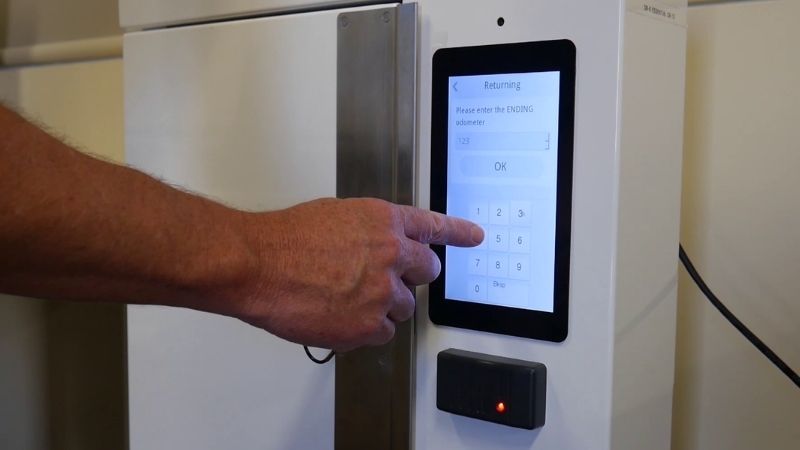Role
Industry
Solutions
Products
“Why don’t I just manage fleet bookings in a Microsoft Outlook Calendar?” It’s a question we are asked frequently at Smartrak.
There’s no denying that you can certainly manage a shared fleet with Microsoft Outlook Calendar. However, we genuinely believe you’d be doing your organisation a great disservice. Outlook is primarily a communications tool. It handles emails and personal calendars with aplomb. However, using a calendar to manage shared resources is like trying to fit a square peg into a round hole.
We’ve put together a list of reasons why a shared Outlook Calendar won’t provide the level of functionality required by any modern Fleet Manager. If you are considering using a shared Outlook Calendar to manage your pool vehicle fleet, read on to learn why a solution like Smartrak’s PoolCar will serve you better in the long run.

It’s no secret that that even the best laid plans can go awry. Especially when it comes to unscheduled traffic jams. When your organisation relies on a shared vehicle fleet, there is a distinct possibility that someone back at the office is waiting to use that vehicle.
But if someone is running late, how do you ensure that any delays don’t snowball throughout the day? How do you ensure the next person has enough notice to change their booking and secure an alternative vehicle?
When managing your pool vehicles in a Shared Outlook Calendar, you are relying on staff to be proactive in these situations. Have you ever had to kick someone out of a meeting room because their booking has run overtime and they haven’t updated the Outlook Calendar booking? Now imagine how much harder that would be if the asset is a vehicle that hasn’t returned to the office. The driver would have to realise that they’re running late and call the staff member of the next booking to notify them. Providing they realise there is another booking and know who created it, of course.
In contrast, PoolCar has an automated system specifically designed to handle situations where the current booking runs overtime. Firstly, the system can automatically add a buffer period between each booking. This grace period smooths out any hiccups from small delays, and the time it takes to return keys to a key management solution. Secondly, an alert is sent to the Fleet Manager that a booking hasn’t been closed off on time. They can action the task of rebooking straight away, without having to involve the individual staff member. Of course, should all other vehicles be out of the office, they can also proactively organise alternative transportation.
When it comes to shared vehicle management, key management is often ignored or downplayed. Organisations are generally focused primarily on the ability to manage bookings. However, it is also vital to make sure that keys can’t be accessed independently of bookings. Otherwise, bookings can fail to work as the vehicle can’t be accessed or operated. Or worse, the vehicle isn’t even where it’s supposed to be.
When managing your pool vehicles with a shared Outlook Calendar, you also lack a key management system. Instead, you rely on staff to make sure they don’t take the wrong keys and return them on time to the right location/hook. Often in these scenarios a member of the administration staff is tasked with their management, or worse, keys are stored in a communal area. If keys go missing or are lost, it is very difficult to audit who last had them.
In contrast, PoolCar integrates directly with our two key management solutions: KeyMaster and Keyless Entry. Both require a valid vehicle booking for staff to access a vehicle’s keys. Utilising these solutions also ensures only authorised staff can access vehicles, and should keys disappear, fleet managers can easily identify who last had them.

Not all vehicles in an organisation’s fleet are shared equally. In some cases, vehicles might only be used for specific purposes or by a select group of staff. Common examples include manual transmissions, maintenance vehicles, and buses. In these cases, it makes sense to restrict which staff can access these vehicles. You don’t want untrained or unauthorised staff damaging equipment or themselves.
Outlook Calendars have limited capacity to restrict who can access a shared resource. If a user can search for it in the scheduling assistant, there’s no way to stop them from booking it. That means you’d have to add in additional layers of administration to ensure you’re gatekeeping mission-critical assets.
PoolCar has the ability to restrict usage on a vehicle-by-vehicle basis. What’s more, you don’t need to allocate more resources to police these restrictions. If a user doesn’t have permission, they simply won’t see the vehicle as an option. Does this truck only need to be driven by the maintenance staff? Does the bus require a special driver’s licence? PoolCar’s vehicle and group permissions make solving these scenarios simple.

It’s important to keep an eye on the odometer readings of fleet vehicles. Readings are used to ensure vehicle maintenance is completed on time, and also tracks the lifecycle of an individual vehicle. It can also be used to claim tax incentives, such as RUC and Fringe Benefits Tax (FBT) in New Zealand, and both FBT and Fuel Tax Credits in Australia.
When organisations rely on Outlook Calendars to manage pool vehicles, it often means they’re also relying on manual paper odometer records. Without fail, this means they’re running into a whole host of problems, including manual data input and tracking data via spreadsheets.
PoolCar has multiple ways to track vehicle odometers, including staff logging into PoolCar and updating their trip distance. When combined with a KeyMaster key cabinet, this data can be captured when the vehicle is returned. The process can also be completely automated by combining PoolCar with a GPS tracking solution like Smartrak’s OBD-II. The data can be pulled directly from the vehicle into the PoolCar system. This means there’s no room for user error.
It’s important for Fleet Managers to be able to make informed decisions about how their vehicles are being utilised. Fleet budgets are often razor thin, so the ability to make potential cost reductions can only be a good thing. Having the tools to do that is therefore incredibly important.
Unfortunately, because a Shared Outlook Calendar is primarily a scheduling tool, it doesn’t capture vehicle utilisation data or have inbuilt reporting capabilities. We often get enquires for PoolCar for exactly these reasons.
PoolCar has a whole suite of inbuilt reports designed specifically to inform Fleet Managers about how their fleet is performing. With this data you can start making informed decisions about your fleet. Do you need more vehicles, or do you have too many? What’s more, you can enhance PoolCar with a GPS tracking solution like our OBD-II. This allows you to gain even more insights on how vehicles are being used when they leave the car park.
Often, organisations spread the costs of their fleet across multiple departments. By analysing the number of bookings each department has made, Fleet Managers can charge the individual departments for their usage. This ensures whoever is running the Fleet Department isn’t responsible for all vehicle running costs.
As far as we can tell, there is no easy way to report on who has booked a shared resource in Shared Outlook Calendars. It may be possible to download an excel report as an Outlook administrator. However, this would likely be a time-intensive process involving data manipulation in various Excel spreadsheets.
PoolCar has the native ability to assign a cost centre to individual users. It can also be a required piece of information when making a booking, so the data isn’t skipped or missed. This means that every vehicle booking is automatically allocated to a department in your organisation. This makes the job of assigning fleet costs a simple and straightforward process for Fleet Managers.
Imagine this scenario: You’re heading out to an important client meeting and you did the right thing by planning ahead and booking a car. Unfortunately, when you go to collect the keys another staff member claims they have a booking for the same vehicle.
In certain cases, Outlook Calendars will allow users to double-book resources. While this might be uncommon, it’s certainly not how a system designed to manage shared resources should operate. Especially when the organisation’s success relies on travel.
PoolCar is a Software as a Service (SaaS) solution. This means it is designed from the ground up to be managed in an online environment. Consequently, as soon as a booking is created, that booking can be viewed by everyone who is logged into the system. It will also not allow another booking for that vehicle and time slot to be created afterwards. This means that double bookings cannot occur.
While we believe that PoolCar is the perfect tool to help organisations manage their shared fleets, we do recognise that it’s not going to be suitable for every use case. If you are a small organisation or only have a couple of (<5) shared vehicles, then it might be worth exploring alternative solutions. PoolCar really starts creating value when its managing 20, 50, or more than 100 vehicles.
However, while a Shared Outlook Calendar might be the best solution for your needs today, it may not always be the case. We’re always more than happy to discuss how Smartrak and PoolCar can help manage your shared fleet.
So, there you have it. While Shared Microsoft Outlook Calendars can certainly manage a shared fleet, in most cases it’s not the best tool for the job. PoolCar automates a large number of tasks associated with shared vehicles fleets. This means Fleet Managers and administrators don’t have to chase missing keys or sort out double bookings.
If you’re ready to simplify your shared fleet, we’d love to hear from you.